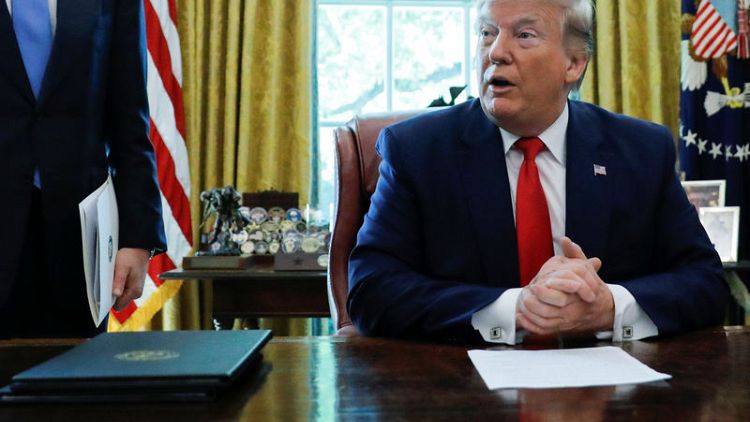By Tim Ahmann and Babak Dehghanpisheh
WASHINGTON/GENEVA (Reuters) - U.S. President Donald Trump said on Wednesday he was "not talking boots on the ground" if military action were necessary against Iran, and said any conflict would not last long.
Asked if a war was brewing, Trump told Fox Business Network: "I hope we don't but we're in a very strong position if something should happen."
"I'm not talking boots on the ground," Trump said. "I'm just saying if something would happen, it wouldn't last very long."
The comments come just days after Trump cancelled air strikes minutes before impact, with allies warning that the increase in tensions since the United States pulled out of a nuclear pact with Iran last year could accidentally lead to war.
Iran suggested it was just one day from breaching a threshold in the agreement that limited its stockpile of uranium stocks, a move that would put pressure on European countries that have tried to remain neutral to pick sides.
The fate of the 2015 nuclear deal, under which Iran agreed to curbs on its nuclear programme in return for access to international trade, has been at the heart of the dispute which has escalated and taken on a military dimension in recent weeks.
Washington sharply tightened sanctions last month, aiming to bar all international sales of Iranian oil. It accuses Iran of being behind bomb attacks on ships in the Gulf, which it denies.
Last week, Iran shot down a U.S. drone it said was in its air space, which Washington denied. Trump ordered retaliatory air strikes but called them off at the last minute, later saying too many people would have died.
OBLITERATION
Although the United States and Iran both say they do not want war, last week's aborted U.S. strikes have been followed by menacing rhetoric on both sides. On Tuesday Trump threatened the "obliteration" of parts of Iran if it struck U.S. interests. President Hassan Rouhani, who normally presents Tehran's mild-mannered face, called White House policy "mentally retarded".
The standoff creates a challenge for Washington which, after quitting the deal against the advice of its European allies, is now seeking their support to force Iran to comply with it.
The Trump administration argues that the 2015 deal reached under his predecessor Barack Obama was too weak because it is not permanent and does not cover issues outside of the nuclear area, such as Iran's missile programme and regional behaviour.
U.S. officials say new sanctions are necessary to force Iran back to the negotiating table, and Trump is open to talks without pre-conditions. Iran says talks are impossible unless Washington lifts sanctions first.
Tehran said a further move by Washington this week to impose personal sanctions on Iran's Supreme Leader Ali Khamenei and threaten them against Foreign Minister Mohmmad Javad Zarif had closed off diplomacy permanently.
(Writing by Peter Graff)
